Understanding the Fundamentals of Routine Dental Checkups and Cleanings
Regular dental checkups and cleanings are foundational to maintaining strong oral health and overall well-being. These visits not only prevent common dental issues such as cavities and gum disease but also enable early detection of more serious conditions like oral cancer and systemic diseases linked to oral health. This article explores why routine dental care matters, what it entails, and how it benefits individuals across all life stages to promote lasting dental wellness and cost-effective health management.
The Critical Role of Regular Dental Checkups in Maintaining Oral Health
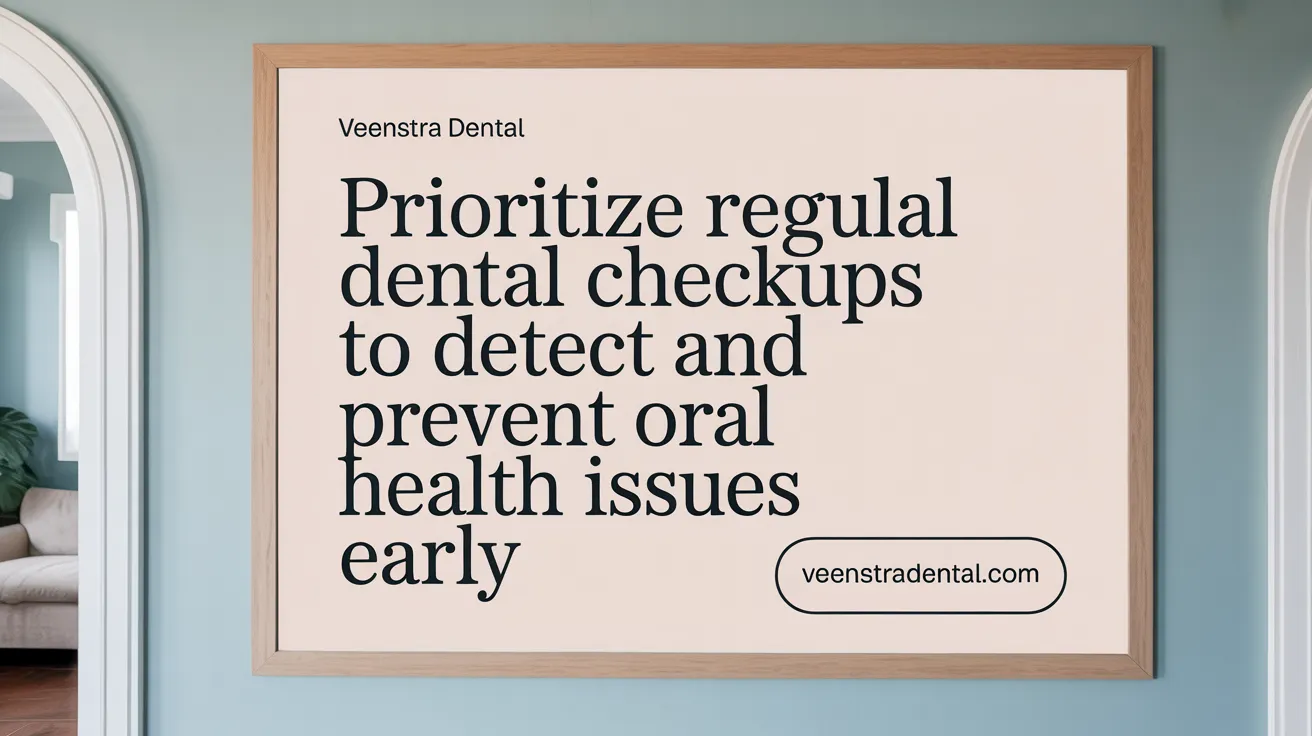
Why are regular dental checkups important for maintaining oral health?
Regular dental checkups are essential for early detection and prevention of common oral health problems. Many issues like cavities, gum disease, and oral cancer often develop silently without pain or obvious symptoms, making routine examinations crucial for catching them before they become severe.
During dental visits, dental professionals perform comprehensive cleanings that remove plaque and tartar—biofilms of bacteria that can only be effectively cleaned by a professional. These cleanings significantly reduce the risk of cavities and periodontal disease.
A thorough dental exam also includes the use of X-rays, which help identify hidden problems such as impacted teeth, abscesses, or early bone loss. Screening for oral cancer is a vital component, as early detection can be life-saving.
Personalized advice on daily oral hygiene practices, dietary habits, and lifestyle choices is provided during these visits, tailored to each individual’s needs. This guidance helps maintain healthy teeth and gums and can improve cosmetic outcomes such as teeth whitening (qualified advice on tooth whitening).
The connection between oral health and overall health is well-established. Poor oral hygiene and untreated gum disease have been linked to systemic conditions like diabetes, heart disease, and stroke. Regular checkups reinforce good health by addressing these potential health links.
Building a trusting relationship with a dentist ensures ongoing management and adherence to recommended care. This relationship encourages patients to be proactive about their oral health, ask questions, and stay committed to regular visits (building trusting dentist relationships).
In sum, routine dental checkups are a cornerstone of maintaining long-term oral and systemic health, preventing painful and costly procedures, and supporting overall well-being.
The Connection Between Oral Health and Overall Well-Being
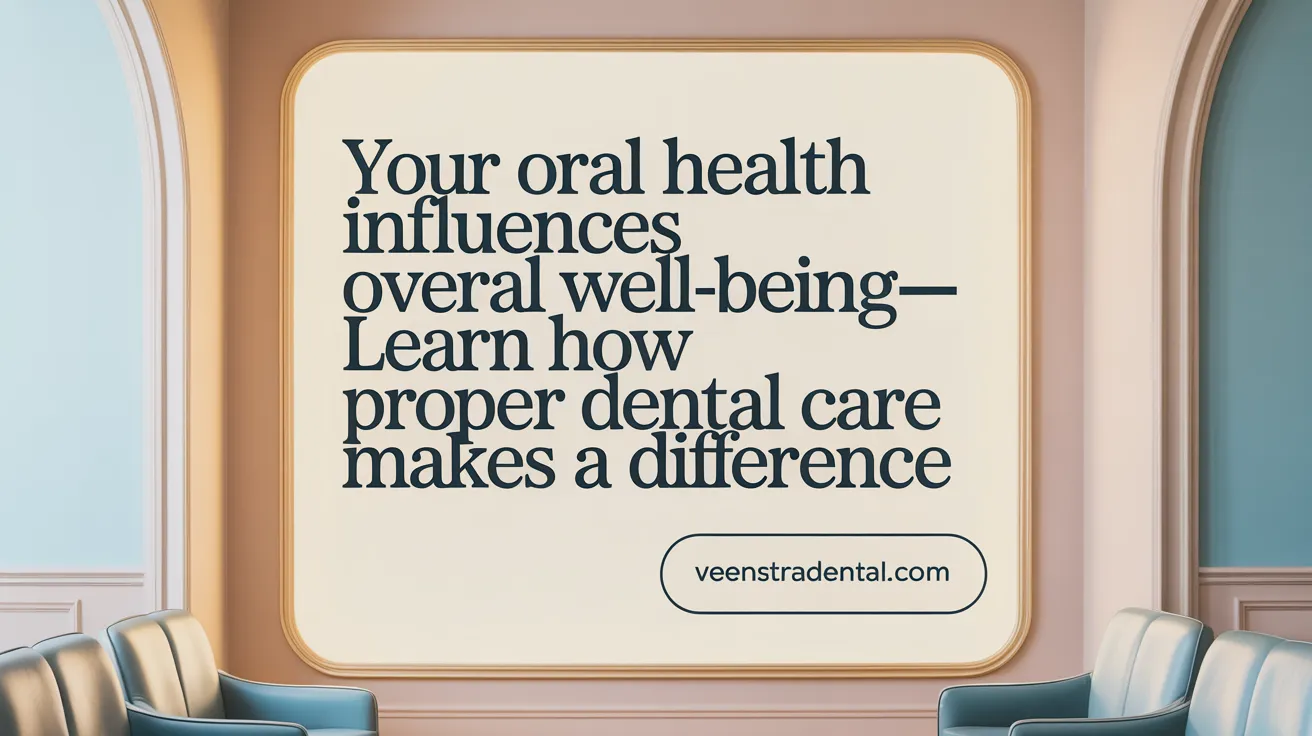
What is the connection between oral health and overall health and well-being?
Oral health is directly linked to overall health because issues like gum disease and bacterial infections in the mouth can influence other parts of the body. Poor oral hygiene may lead to systemic conditions such as heart disease, diabetes, respiratory infections, and certain types of cancer. See more on the importance of regular dental checkups.
Impact of oral hygiene on systemic conditions
Bacteria from the mouth can enter the bloodstream through inflamed or bleeding gums, causing inflammation that affects blood vessels and organs. This inflammation has been associated with increased risk of cardiovascular problems such as heart attacks and strokes. For diabetics, gum disease can worsen blood sugar control, creating a cycle that complicates health management. Learn about oral hygiene and overall health.
Oral bacteria and inflammation
Persistent bacterial infections in the mouth, like periodontitis, release toxins and inflammatory molecules that contribute to systemic inflammation. This chronic inflammatory state is a common factor in many health conditions, making oral infections more than just a dental concern. Read more about periodontal disease and its effects.
Risk reduction through dental care
Regular dental checkups, professional cleanings, and maintaining good oral hygiene habits help control bacterial growth and prevent gum disease. These practices can lower the risk of bacteria entering the bloodstream and reduce systemic inflammation. Additionally, lifestyle choices such as quitting smoking, eating a balanced diet, and managing medical conditions further decrease health risks. Explore the benefits of preventive dental care and regular dental visits.
Recent research on oral-systemic links
New studies continue to explore connections between oral bacteria and neurodegenerative diseases like Alzheimer's, suggesting that the mouth might influence brain health. Evidence also supports that improving oral health can reduce the overall burden of chronic diseases. Including oral health care as part of overall wellness strategies is increasingly recognized as essential for a healthier, longer life. See insights on the oral health and systemic diseases link.
More information search query
For further insights, search terms like "oral health impact on systemic diseases and overall wellness" can yield comprehensive recent research and guidelines. Additional resources on preventive dentistry and its importance offer helpful guidance.
Routine Dental Cleanings: Procedures, Types, and Key Benefits
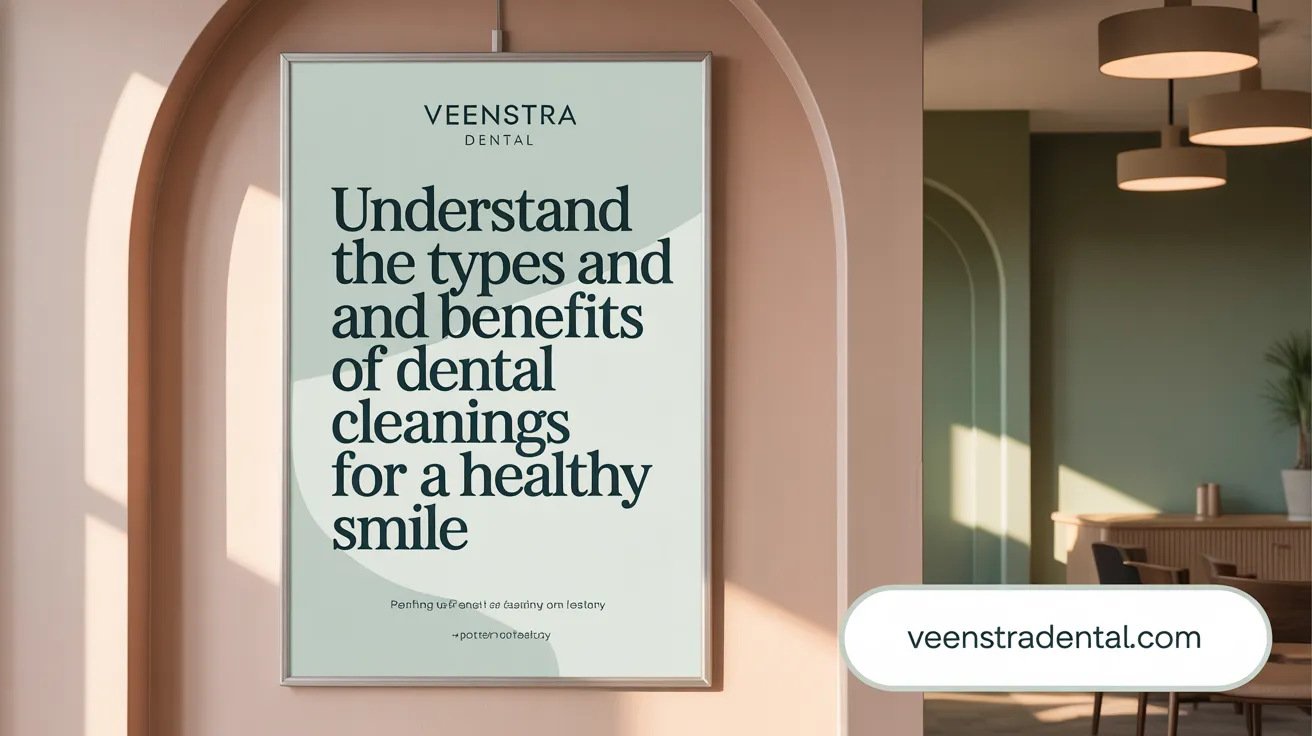
What procedures are involved in dental cleanings, and what can patients expect during routine visits?
Dental cleanings involve several procedures designed to remove plaque, tartar, and bacteria, which are critical for maintaining oral health. During a typical visit, a dental hygienist examines the mouth, removing hardened plaque (tartar) using specialized tools through a process called scaling. This step helps eliminate buildup that brushing and flossing cannot remove. Afterwards, the hygienist polishes the teeth with a gritty paste to smooth the surfaces and remove surface stains, improving the appearance of teeth. Often, a fluoride treatment is applied to help strengthen enamel and prevent cavities.
Patients can expect an initial oral examination, which may include checking for cavities, gum inflammation, and other issues. The cleaning process usually lasts between 30 to 60 minutes, depending on individual needs. Some temporary sensitivity or gum soreness may occur afterward, but these effects typically diminish quickly.
Additionally, routine cleanings include personalized advice on good oral hygiene practices to continue effective home care. The entire process is safe, effective, and essential in preventing cavities, gum disease, and bad breath, besides enhancing overall dental appearance.
What are the different types of dental cleanings, and when is each type needed?
There are four main categories of dental cleanings tailored to different oral health needs:
| Type of Cleaning | Purpose | When Needed | Description |
|---|---|---|---|
| Prophylaxis | Routine prevention | Every six months or as advised | This is the standard cleaning for healthy mouths. It involves scaling to remove plaque and tartar above the gumline, polishing, and sometimes fluoride application. It helps prevent cavities and gum disease. |
| Scaling and Root Planing | Treatment for gum disease | As determined by a dentist | A deep cleaning used when gum inflammation or periodontal disease is present. It involves cleaning below the gum line (scaling) and smoothing rough root surfaces (root planing) to reduce bacterial infection and inflammation. |
| Periodontal Maintenance | Ongoing gum health management | Every 3–4 months | More frequent cleanings for patients with a history of periodontal disease, helping manage bacterial buildup and prevent relapse. |
| Gross Debridement | Heavy tartar removal | When significant buildup blocks further examination | Used when excessive tartar or plaque prevents a comprehensive exam. It involves more extensive cleaning to remove large accumulations and prepare the mouth for detailed evaluation. |
Choosing the right cleaning depends on the patient’s current oral health status, with healthy individuals typically needing prophylaxis, while those with gum issues may require more advanced procedures. Regular professional cleanings, in combination with good home care, are vital in preventing dental problems and promoting oral and overall health.
Preventive Dental Care and Its Influence on Long-term Oral Health and Costs
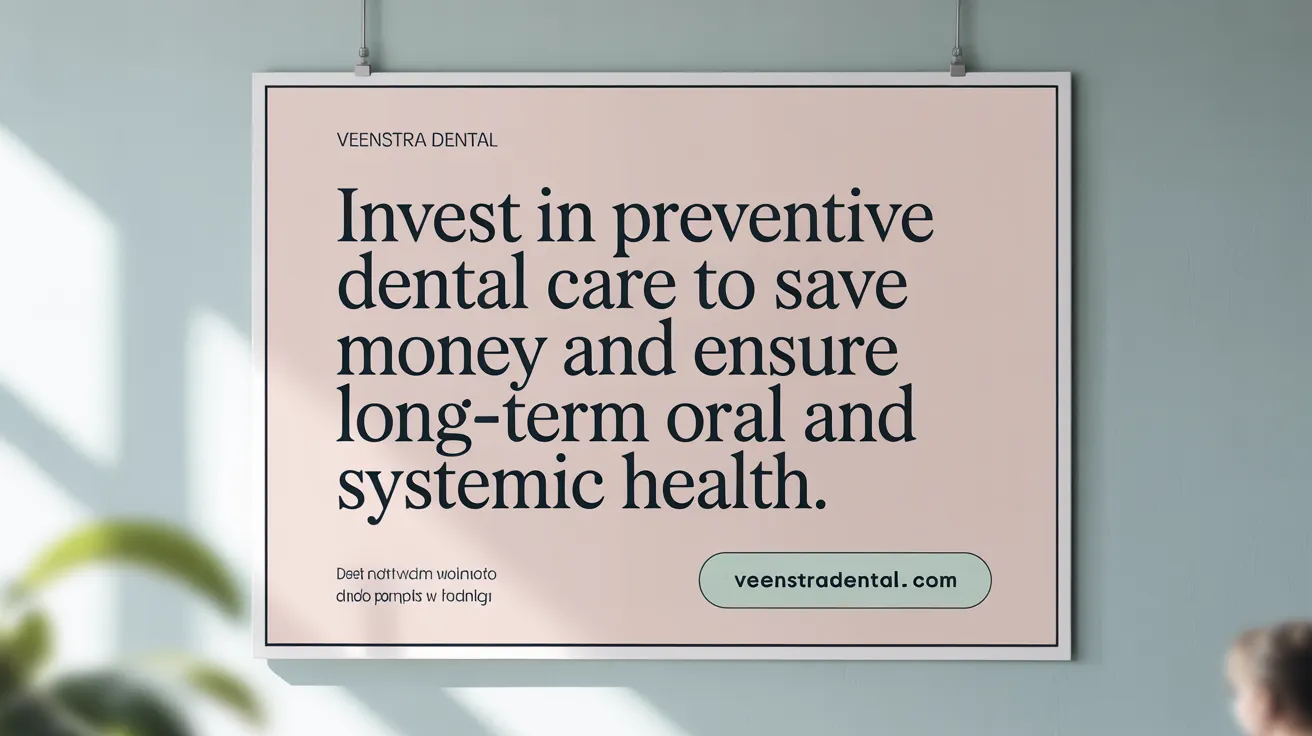 Routine dental care plays a fundamental role in safeguarding long-term oral health and reducing healthcare expenses. By supporting early intervention, regular visits help detect dental issues such as cavities, gum disease, and infections before they develop into more severe, costly problems. Professional cleanings, sealants, and screenings performed during routine checkups minimize the need for invasive procedures like root canals or extractions later on (Preventive Dental Care, Benefits of Preventive Dental Care, Regular dental check-ups).
Routine dental care plays a fundamental role in safeguarding long-term oral health and reducing healthcare expenses. By supporting early intervention, regular visits help detect dental issues such as cavities, gum disease, and infections before they develop into more severe, costly problems. Professional cleanings, sealants, and screenings performed during routine checkups minimize the need for invasive procedures like root canals or extractions later on (Preventive Dental Care, Benefits of Preventive Dental Care, Regular dental check-ups).
One of the most tangible benefits of preventive dental care is its potential to lower overall costs. Studies indicate that adults who maintain consistent preventive practices can face up to 43% lower dental expenses over a span of five years. These savings come from fewer emergency treatments, less need for complex restorative work, and reduced medical costs associated with systemic health issues linked to poor oral health (Preventive dentistry benefits, Cost-effective dental care, Saving money with early dental treatment).
Furthermore, good oral hygiene and regular checkups are linked to improved systemic health outcomes, reducing risks for conditions such as heart disease and diabetes complications. This holistic approach to health underscores the importance of early and ongoing dental intervention (Oral health and overall health link, Early detection and prevention, Importance of routine dental visits).
Access to affordable dental services and public health programs enhances the utilization of preventive care among underserved populations. This not only benefits individual health but also leads to societal advantages, such as decreased healthcare disparities, lower societal costs, and improved employment prospects for individuals with healthier smiles (Preventive dental care and disparities, The value of preventive oral health care).
In summary, investing in routine dental visits and preventive treatments creates a cycle of health benefits and financial savings. It helps individuals maintain a healthy smile, reduces the likelihood of costly dental emergencies, and contributes positively to overall health and economic stability (Importance of regular dental visits, Benefits of routine dental care, Routine dental checkups every 6 months).
Maintaining Good Oral Hygiene Alongside Regular Dental Visits
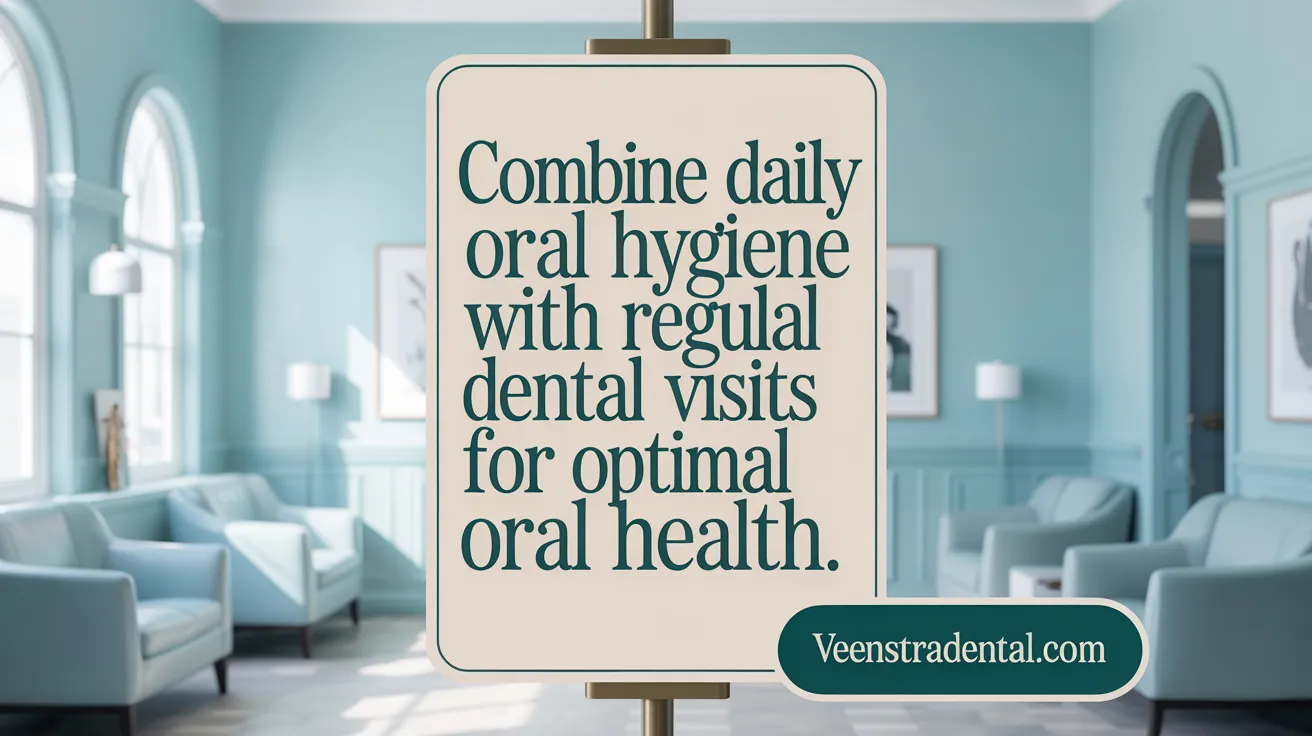
Why is it important to maintain good oral hygiene practices alongside regular dental visits?
Maintaining good oral hygiene at home is crucial in preventing plaque accumulation, cavities, and gum disease. Brushing twice daily with fluoride toothpaste, flossing daily, and using mouthwash help control harmful bacteria and keep teeth and gums healthy (proper oral hygiene practices).
Regular dental visits play a supporting role by providing professional cleanings, early detection of dental problems, and tailored treatments to prevent minor issues from becoming serious (importance of regular dental visits).
Combining daily routines with routine checkups creates a powerful defense against oral diseases and promotes overall health (importance of regular dental checkups). Good oral health reduces risks of systemic conditions like heart disease, stroke, and respiratory infections (oral health and overall health).
The synergy between consistent home care and professional dental care ensures long-term maintenance of oral and general well-being, making it the best strategy for lifelong dental health (benefits of preventive dental care).
Dental Care Throughout Life: Tailoring Checkups and Cleanings for All Ages
What are the common milestones in children's dental care?
In childhood, establishing good oral hygiene habits early is vital. Children should see a dentist when their first tooth erupts or by their first birthday. Regular visits every six months help monitor dental development, apply fluoride treatments, and place sealants to protect against cavities. Early dental care promotes healthy growth and prevents issues like misalignment, which could require orthodontic treatment later (Preventive Dental Care, Dental Visits for Children).
What preventive strategies are important for adults?
For adults, routine checkups are crucial to detect early signs of gum disease, decay, and oral cancers. Professional cleanings remove plaque and tartar that regular brushing and flossing might miss. Many adults also pursue cosmetic procedures like whitening or veneers during regular visits. Maintaining good habits such as brushing twice daily, flossing, and managing diet support long-term oral health (Importance of Regular Dental Visits, Oral Hygiene, Professional Dental Cleaning Benefits).
What unique considerations exist for senior dental health?
As people age, dental challenges like gum recession, dry mouth, and tooth loss become more common. Routine visits help manage these issues, monitor existing dental work, and ensure proper function. Special attention to age-related needs supports overall health, comfort, and quality of life (Benefits of Preventive Dental Care for Seniors, Senior Oral Health Management).
How should the frequency of dental visits be personalized?
Most individuals are advised to see their dentist at least twice a year. However, personalized schedules depend on health status, oral hygiene habits, and risk factors. Those with gum disease, recent dental treatments, or medical conditions may require more frequent visits, such as every three to four months. Conversely, low-risk, healthy individuals might only need yearly checkups (How Often to See Your Dentist, Dental Checkups Every 6 Months).
How do risk factors influence scheduling roles?
Factors like smoking, poor diet, medical conditions like diabetes, and use of certain medications increase vulnerability to dental problems. These risks often necessitate more frequent visits for early detection and prevention. Personalized scheduling based on risk assessments ensures tailored care that effectively maintains oral and overall health (Risk Factors and Dental Visits, Preventive Dentistry Importance).
| Age Group | Typical Visit Frequency | Special Considerations | Risk Factors Impact |
|---|---|---|---|
| Children | Every 6-12 months | First visit by age 1, fluoride and sealants for protection | Feeding habits, early dental issues |
| Adults | Every 6 months | Preventive care and cosmetic treatments | Medical conditions (diabetes, heart disease), lifestyle habits |
| Seniors | Every 3-6 months | Managing dry mouth, gum recession, dental prosthetics | Age-related diseases, medications, decreased immune system |
| High-Risk Individuals | Every 3-4 months | Monitoring gum health, existing periodontal disease | Smoking, poor oral hygiene, systemic health issues |
Regular, personalized dental care throughout life supports not only oral health but also overall well-being, reducing the risk of systemic diseases and ensuring a confident smile at every stage (Overall Oral Health and Systemic Benefits, Preventive Care Benefits).
Embracing Routine Dental Care for Lifelong Oral Health
Routine dental checkups and cleanings are indispensable for maintaining not just a healthy smile but also supporting overall systemic health. By facilitating early detection and prevention of dental diseases, these preventive visits reduce the risk of costly procedures and enhance quality of life across all age groups. Coupled with good daily oral hygiene practices, regular dental care promotes long-lasting oral function, improved appearance, fresher breath, and overall well-being. Tailoring dental visit frequency based on individual health needs ensures everyone receives optimal care. Investing time and attention in routine dental care today leads to a lifetime of benefits and substantial health care savings in the future.
